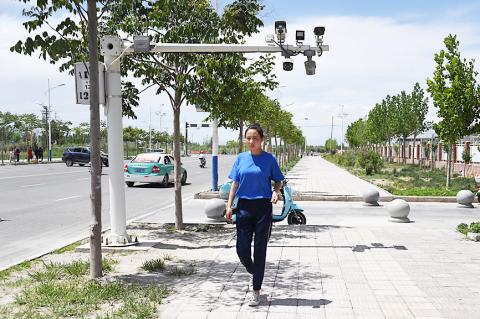Uighur activists on Tuesday said that they have documented nearly 500 camps and prisons run by China to detain members of the ethnic group, alleging that Beijing could be holding far more than the commonly cited figure of 1 million people.
The Washington-based East Turkistan National Awakening Movement, a group that seeks independence for the Xinjiang region, gave the geographic coordinates of 182 suspected “concentration camps” where Uighurs are allegedly pressured to renounce their culture.
Researching imagery from Google Earth, the group said it also spotted 209 suspected prisons and 74 suspected labor camps, for which it would share details later.

Photo: AFP
“In large part, these have not been previously identified, so we could be talking about far greater numbers” of people detained, movement director of operations Kyle Olbert said.
“If anything, we are concerned that there may be more facilities that we have not been able to identify,” he told a news conference in Washington.
Anders Corr, an analyst who formerly worked in US intelligence and who advised the group, said that about 40 percent of the sites had not been previously reported.
Rights advocates have generally estimated that China is detaining more than 1 million Uighurs and members of other predominantly Muslim ethnicities, but US Assistant Secretary of Defense for Asian and Pacific Security Affairs Randall Schriver in May said that the figure was “likely closer to 3 million citizens” — an extraordinary number in a region of about 20 million people.
Olbert said that archive imagery from alleged camp sites showed consistent patterns — steel and concrete construction over the past four years, along with security perimeters.
He said that the group tried to verify the nature of each site with on-the-ground accounts, but declined to give greater detail, citing the need to protect sources.
The Chinese Ministry of Foreign Affairs said that the allegations were “baseless.”
“East Turkestan organizations outside China have long conducted activities harming China’s national security,” ministry spokesman Geng Shuang (耿爽) said at a regular media briefing in Beijing yesterday.
He said it was “clear for all to see” that China’s policies in Xinjiang had promoted “ethnic unity and social harmony.”
Activists and witnesses say China is using torture to forcibly integrate Uighurs into the Han majority, including pressuring Muslims to give up tenets of their faith — such as praying, and abstaining from pork and alcohol.
Olbert described China’s policy as “genocide by incarceration,” fearing that Uighurs would be held indefinitely.
“It’s like boiling a frog. If they were to kill 10,000 people a day, the world might take notice, but if they were just to keep everyone imprisoned and let them die off naturally, perhaps the world might not notice. I think that’s what China is banking on,” Olbert said.
China has justified its policy after first denying the existence of the camps, saying it is providing vocational training and coaxing Muslims away from extremism.
The US has likened China’s treatment of Uighurs to Nazi Germany’s concentration camps, but Beijing has faced limited criticism outside the West.

SECURITY: As China is ‘reshaping’ Hong Kong’s population, Taiwan must raise the eligibility threshold for applications from Hong Kongers, Chiu Chui-cheng said When Hong Kong and Macau citizens apply for residency in Taiwan, it would be under a new category that includes a “national security observation period,” Mainland Affairs Council (MAC) Minister Chiu Chui-cheng (邱垂正) said yesterday. President William Lai (賴清德) on March 13 announced 17 strategies to counter China’s aggression toward Taiwan, including incorporating national security considerations into the review process for residency applications from Hong Kong and Macau citizens. The situation in Hong Kong is constantly changing, Chiu said to media yesterday on the sidelines of the Taipei Technology Run hosted by the Taipei Neihu Technology Park Development Association. With

A US Marine Corps regiment equipped with Naval Strike Missiles (NSM) is set to participate in the upcoming Balikatan 25 exercise in the Luzon Strait, marking the system’s first-ever deployment in the Philippines. US and Philippine officials have separately confirmed that the Navy Marine Expeditionary Ship Interdiction System (NMESIS) — the mobile launch platform for the Naval Strike Missile — would take part in the joint exercise. The missiles are being deployed to “a strategic first island chain chokepoint” in the waters between Taiwan proper and the Philippines, US-based Naval News reported. “The Luzon Strait and Bashi Channel represent a critical access

‘FORM OF PROTEST’: The German Institute Taipei said it was ‘shocked’ to see Nazi symbolism used in connection with political aims as it condemned the incident Sung Chien-liang (宋建樑), who led efforts to recall Democratic Progressive Party (DPP) Legislator Lee Kun-cheng (李坤城), was released on bail of NT$80,000 yesterday amid an outcry over a Nazi armband he wore to questioning the night before. Sung arrived at the New Taipei City District Prosecutors’ Office for questioning in a recall petition forgery case on Tuesday night wearing a red armband bearing a swastika, carrying a copy of Adolf Hitler’s Mein Kampf and giving a Nazi salute. Sung left the building at 1:15am without the armband and apparently covering the book with a coat. This is a serious international scandal and Chinese

COUNTERINTELLIGENCE TRAINING: The ministry said 87.5 percent of the apprehended Chinese agents were reported by service members they tried to lure into becoming spies Taiwanese organized crime, illegal money lenders, temples and civic groups are complicit in Beijing’s infiltration of the armed forces, the Ministry of National Defense (MND) said in a report yesterday. Retired service members who had been turned to Beijing’s cause mainly relied on those channels to infiltrate the Taiwanese military, according to the report to be submitted to lawmakers ahead of tomorrow’s hearing on Chinese espionage in the military. Chinese intelligence typically used blackmail, Internet-based communications, bribery or debts to loan sharks to leverage active service personnel to do its bidding, it said. China’s main goals are to collect intelligence, and develop a